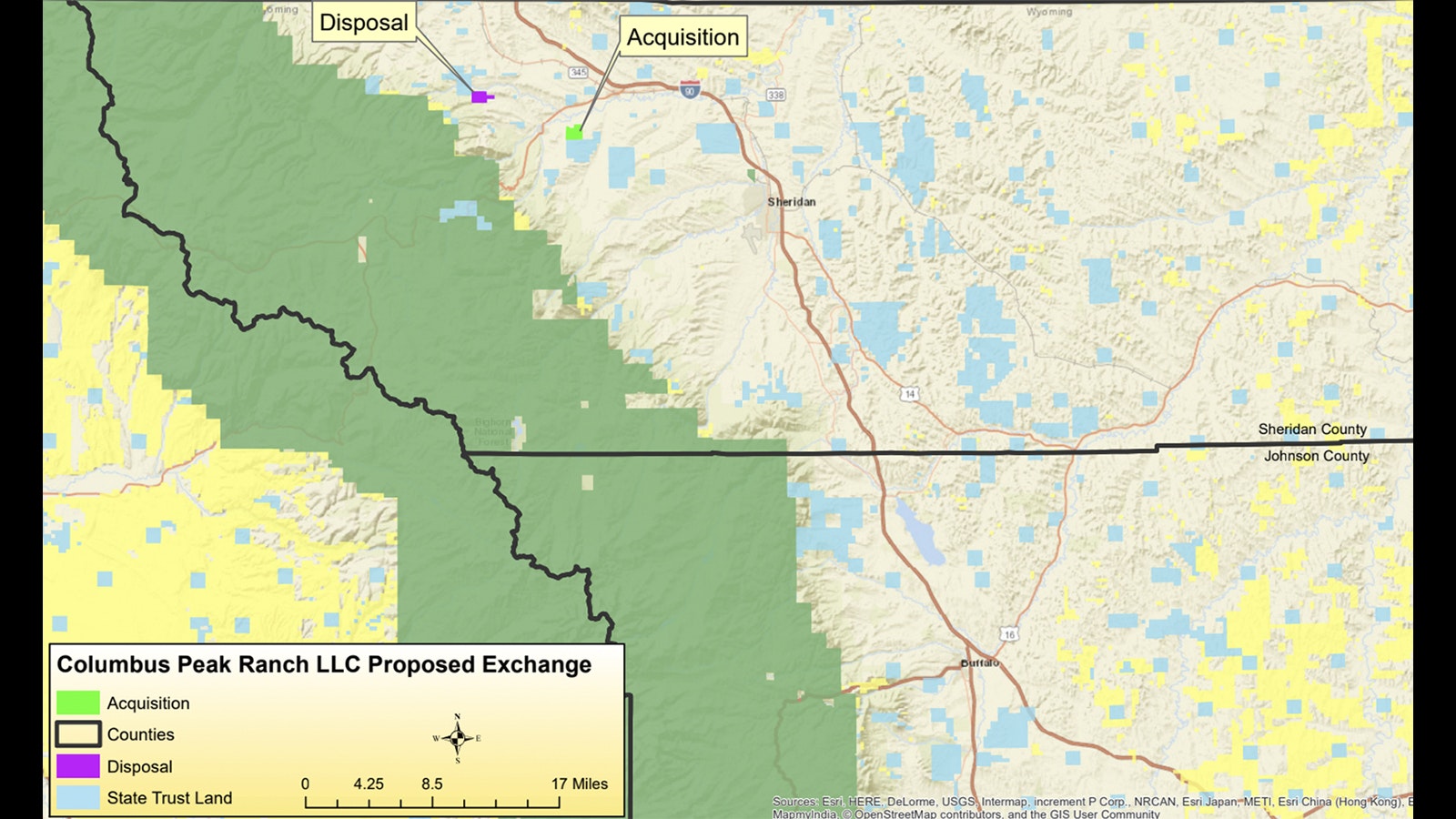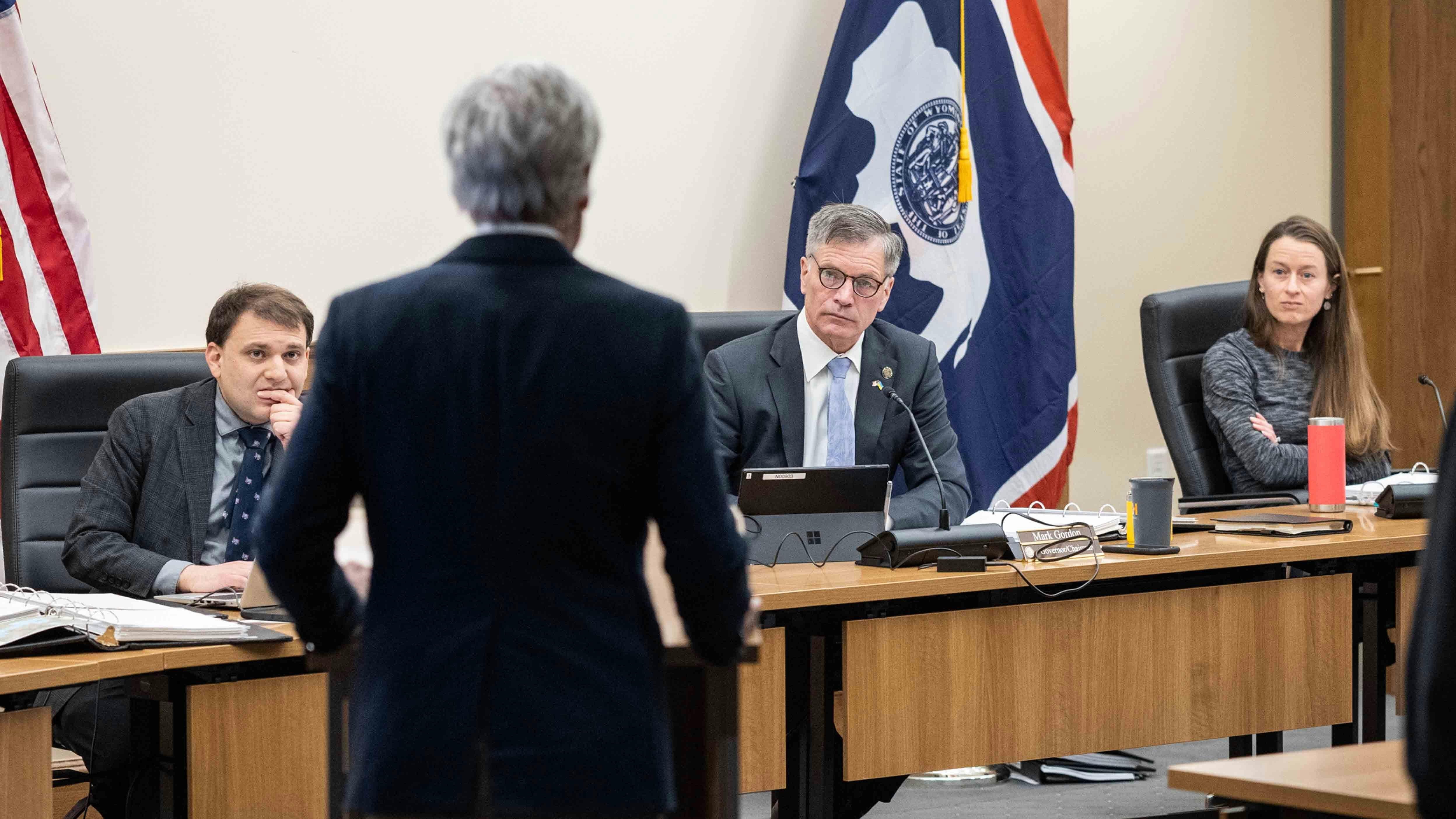A leading official with the Wyoming Office of State Lands and Investments says a new appraisal of some type should be performed before a controversial proposed transfer of state lands in Sheridan County is considered.
“We do need to start thinking about updating that (appraisal price), or getting a new one, or understanding what the impact of the new values in the area may have to the transaction,” said Jason Crowder, deputy director of OSLI.
Discussion on the transfer was delayed for a third time last week by the state Board of Land Commissioners.
The proposed swap outside Dayton in Sheridan County would involve trading 628.35 acres of privately owned land and $410,950 for 560 acres of state trust land at the base of the Bighorn Mountains about 10 miles away.
Ross Matthews is proposing the public land swap in return for land on his Columbus Peak Ranch. Matthews is the former chairman and chief executive officer of Sinclair Oil.
Many opponents of the transfer have said the state isn’t getting fair value for the public land and is failing to consider that the trust land supposedly has higher quality recreation than the ranch land.
Wyoming Game and Fish determined there will be no negative recreational losses as a result of the transfer, but many northern Wyoming hunters disagree, citing the state land as a prime location for deer and elk hunting.
The Appraisals
A June 2020 appraisal of the state lands determined a market value of nearly $2.3 million, while the Columbus Peak Ranch property had a value of about $1.9 million at that time.
There have been no further appraisals, a major point of contention for those opposing the transfer. There are no rules within the Land Transaction Program that require additional appraisals on a land transfer.
“Market conditions need to dictate that as well as parties involved in the transaction,” Crowder said. “It really is a judgment call.”
Since the June 2020 appraisal, the Wyoming real estate market has substantially impacted by COVID-19 pressures and overall inflation significantly increasing prices.
Although Crowder said real estate market growth is often slow in certain communities throughout the state, Sheridan County is not one of them. Sheridan, Park and Teton counties, highly desirable parts of the state because of their scenic beauty and access to public lands, saw astronomical real estate growth during the pandemic due to a large influx of people moving from more expensive locales out of state.
Delays In the Process
A typical land transfer takes a few years to complete from the submission of an application to final approval to allow for an appraisal and for staff to adequately consider the proposal.
The Dayton land transfer has taken especially long because of a few factors.
In October 2019, the Office of State Lands and Investments recommended approving the swap. The office said the swap would improve the manageability and potential uses of the land and income generating potential for the state.
Matthews has said he believes there are as many recreation opportunities on his land as the public parcel.
Rick Clark, a member of the State Lands Action Team, which has opposed the land transfer, said notes from the appraisal identify agriculture as the best use for the ranch land.
Public Late To The Table
The transfer was given initial approval by the Board of Land Commissioners in October 2019. A few months later came the COVID-19 pandemic.
It was not until spring 2021 that the Sheridan County community at large was notified about the project, although there was brief public notice made about the October 2019 consideration before the board.
State Rep. Cyrus Western, R-Big Horn, has vehemently opposed the land transfer process and delays in notifying the public, saying that “the cake is already 80% baked by the time the public sees it."
He crafted legislation in 2022 that would have made automatic public notice required upon submission of any land transfer application. Gov. Mark Gordon, who sits on the board, vetoed it.
Crowder disagrees, and said the delay between the submission of a land transfer application and mass public notice is logical. He said OSLI must first determine if a proposed land transfer meets all the requirements of the program before it’s worth bringing to the attention of the public.
“For us, as the fiduciary agency, trying to ensure the transaction meets that requirement, we need ensure that it does,” Crowder said. “If it doesn’t meet those, there’s no sense in moving it forward. If it does meet those, then we can provide it to the public.”
Crowder said another factor behind the Columbus Peak delays has been office turnover and the agency’s inability to hire a new real estate analyst. The salaried position, which pays $56,844 to $71,052, has been vacant since May 2022, leading to a complete halt in land transfers.
Crowder said there are about 10-12 transfers under consideration and that, “all of those transactions are just sitting in limbo at the moment.”

Perception
Although state trust lands are publicly accessible, Crowder said the public should consider them with a different lens than they would public federal lands.
He sees lands that were granted by the federal government upon Wyoming’s statehood as existing to support specific institutions like state government and its Common School Permanent Land Trust Fund.
“They’re not public lands,” he said. “They are solely here for the benefit of the beneficiaries.”
Crowder said the public at large is not considered among those beneficiaries, although their access to recreate on the state lands is provided.
The purpose of the state Land Transaction Program is to create a diverse and productive portfolio to generate the maximum amount of revenue for the state's trust beneficiaries. With each decision, the board and OSLI staff must consider the impact of the transfer on the surrounding community, including recreational impacts.
“They have extremely broad discretion to manage these lands as they see fit,” Crowder said.
Debate Seems Far From Over
Game and Fish has recommended that the land be enrolled in its AccessYes Walk In program, which works with landowners to provide free hunting and fishing opportunities on private and inaccessible public lands.
Matthews contends there is an equal amount of water on the ranch land he wants to trade, and that “the private lands offer more access to more water – for wildlife and for recreation,” he wrote in a letter to OSLI Director Jenifer Scoggin.
Clark disagrees, saying the two reservoirs on the state land amount to more than four times the amount of surface water found in the ponds on Matthews’ land.
Nearly 90% of the public comments about the transfer oppose it. Crowder said the board has broad discretion to consider public input, even if a project meets all criteria to qualify for an approved land transfer.
“We take it very seriously around here, and I know the Board of Land Commissioners does as well,” Crowder said. “They read every single comment that comes in.”








